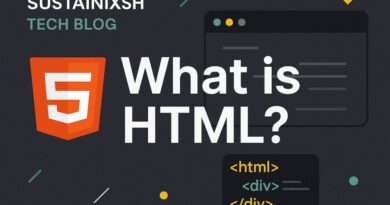Unlocking Web Development Power: A Dive into PHP Frameworks
Unlocking Web Development Power: A Dive into PHP Frameworks (Laravel, Symfony, CodeIgniter)
In the dynamic world of web development, efficiency, scalability, and robust architecture are paramount. This is where PHP frameworks shine, offering developers a structured and streamlined approach to building everything from simple websites to complex enterprise applications. No longer just for hobbyists, PHP, powered by its powerful frameworks, continues to be a dominant force in the web, underpinning a significant percentage of online infrastructure.
Let’s explore three leading PHP frameworks that are shaping the future of web development in 2025 and beyond: Laravel, Symfony, and CodeIgniter.
Why Embrace PHP Frameworks? The Core Advantages
Before we dive into the specifics, it’s crucial to understand why PHP frameworks are a game-changer for any web developer or business:
- Rapid Development: Frameworks provide pre-built modules, libraries, and tools for common tasks like authentication, database interaction, and routing. This significantly reduces the amount of code you need to write from scratch, accelerating your project’s time-to-market.
- Enhanced Security: Built-in security features, like protection against SQL injection, Cross-Site Scripting (XSS), and Cross-Site Request Forgery (CSRF), are a standard in most modern frameworks. This helps you develop more secure applications with less effort.
- Maintainability and Scalability: Adhering to architectural patterns like MVC (Model-View-Controller), frameworks promote organized, readable, and maintainable codebases. This makes it easier for teams to collaborate, debug, and scale applications as your user base grows.
- Community Support and Ecosystem: Popular frameworks boast large, active communities and extensive ecosystems of packages, plugins, and resources. This means abundant documentation, tutorials, and readily available solutions to common development challenges.
- Adherence to Best Practices: Frameworks are designed with industry best practices in mind, ensuring your applications are well-structured, performant, and compliant with coding standards.
1. Laravel: The Elegant Powerhouse
Laravel has consistently held its position as the most popular PHP framework for good reason. It’s renowned for its elegant syntax, developer-friendly approach, and a rich ecosystem that makes web development a true pleasure.
Key Features & Why Developers Love It:
- Eloquent ORM: Laravel’s powerful Object-Relational Mapper simplifies database interactions, allowing you to work with your database using expressive PHP syntax instead of raw SQL.
- Blade Templating Engine: A lightweight yet robust templating engine that makes creating dynamic and reusable views incredibly intuitive.
- Artisan Console: A command-line interface that automates repetitive tasks, from creating models and controllers to running migrations and seeding databases.
- Authentication & Authorization: Comprehensive and easy-to-implement features for user authentication, password hashing, and authorization, significantly speeding up development of secure user systems.
- Vast Ecosystem: Beyond the core framework, Laravel offers a suite of official packages and services like Laravel Nova (admin panel), Laravel Horizon (queue management), and Laravel Vapor (serverless deployment), catering to diverse project needs.
- API Development Excellence: With first-party support and tools, Laravel is a top choice for building robust and scalable RESTful APIs and even embracing emerging trends like GraphQL.
Best For: Rapid development of modern web applications, SaaS platforms, e-commerce solutions, and API-driven services. Its balance of features and ease of use makes it suitable for startups and established businesses alike.
2. Symfony: The Enterprise-Grade Architect
Symfony is a highly flexible and modular PHP framework often favored for large-scale, enterprise-level applications that demand precision, stability, and long-term maintainability. Many components within other popular frameworks, including Laravel, are actually derived from Symfony, a testament to its robust and well-engineered architecture.
Key Features & Why Enterprises Choose It:
- Modular Components: Symfony’s core strength lies in its reusable components (called “Bundles”), which can be used independently or as part of the full framework. This offers unparalleled flexibility and control over your application’s architecture.
- Dependency Injection: A powerful design pattern that promotes loosely coupled code, making applications more testable, maintainable, and scalable.
- Twig Templating Engine: A fast, secure, and flexible templating engine that strictly separates logic from presentation, ideal for complex UI structures.
- Doctrine ORM: A highly flexible and powerful ORM for advanced database interactions, particularly suited for complex data models and queries.
- Extensive Testing Capabilities: Symfony provides robust tools and a structured approach for comprehensive unit, functional, and integration testing, ensuring application reliability.
- Long-Term Support (LTS): Symfony offers LTS releases, providing extended maintenance and security updates, which is crucial for large, mission-critical applications.
Best For: Building complex enterprise-level applications, B2B platforms, ERP systems, and projects requiring high scalability, custom AI logic, deep system integration, and strict adherence to coding standards.
3. CodeIgniter: The Lightweight Speedster
CodeIgniter is a lightweight, high-performance PHP framework that prioritizes simplicity and speed. It’s an excellent choice for developers who prefer minimal configuration and a small footprint, offering a straightforward approach to web development.
Key Features & Why Developers Appreciate Its Simplicity:
- Minimalist Footprint: CodeIgniter is incredibly lightweight, leading to faster execution times and lower resource consumption.
- Easy Learning Curve: With clear documentation and a less opinionated structure compared to other frameworks, CodeIgniter is highly accessible for beginners and those looking for rapid development.
- MVC Architecture: While being lightweight, it still adheres to the Model-View-Controller pattern, providing a structured approach for application development.
- Built-in Libraries & Helpers: It comes with a good set of ready-made libraries for common tasks like form validation, session management, email, and file uploads, saving development time.
- Flexibility: CodeIgniter offers developers more freedom in structuring their projects, allowing for quick iteration and custom solutions.
- Strong Security Features: Despite its lightweight nature, CodeIgniter includes essential security features like XSS filtering and CSRF protection.
Best For: Small to medium-sized projects, rapid prototyping, simple blog applications, API development where speed is paramount, and scenarios where a very low learning curve is desired.
Choosing Your PHP Framework: A Strategic Decision
The “best” PHP framework isn’t a one-size-fits-all answer. Your choice depends heavily on your project’s specific requirements, your team’s expertise, and your desired development speed.
- For cutting-edge features, a thriving community, and rapid development of modern applications: Laravel is likely your top contender.
- For robust, highly scalable enterprise solutions requiring granular control and long-term stability: Symfony offers the power and flexibility you need.
- For speed, simplicity, and smaller to medium-sized projects where a quick launch is critical: CodeIgniter remains a reliable and efficient choice.
As PHP web development continues to evolve, these frameworks remain at the forefront, empowering developers to build exceptional digital experiences. By understanding their unique strengths, you can make an informed decision and leverage the power of PHP to bring your next web project to life.



